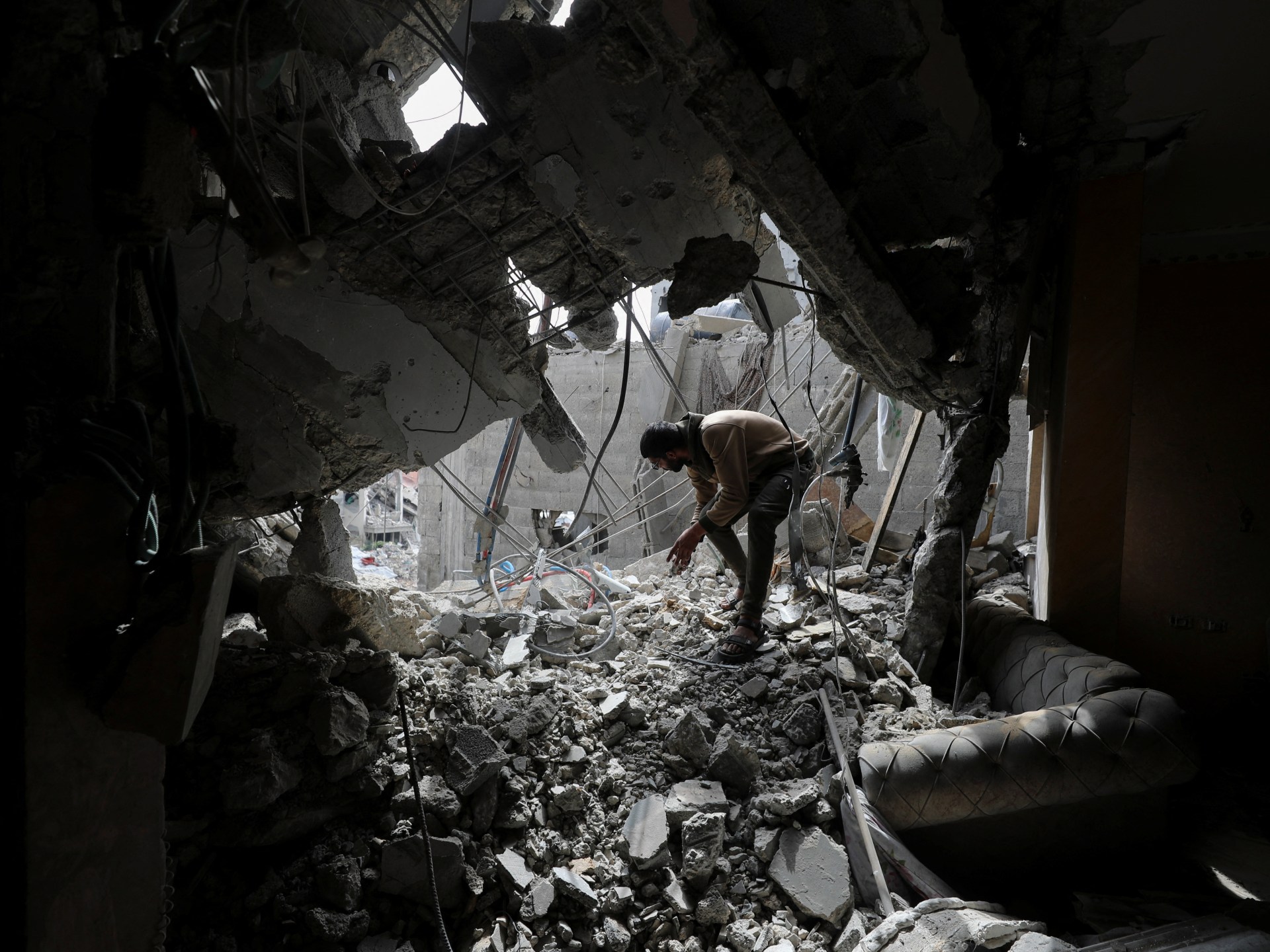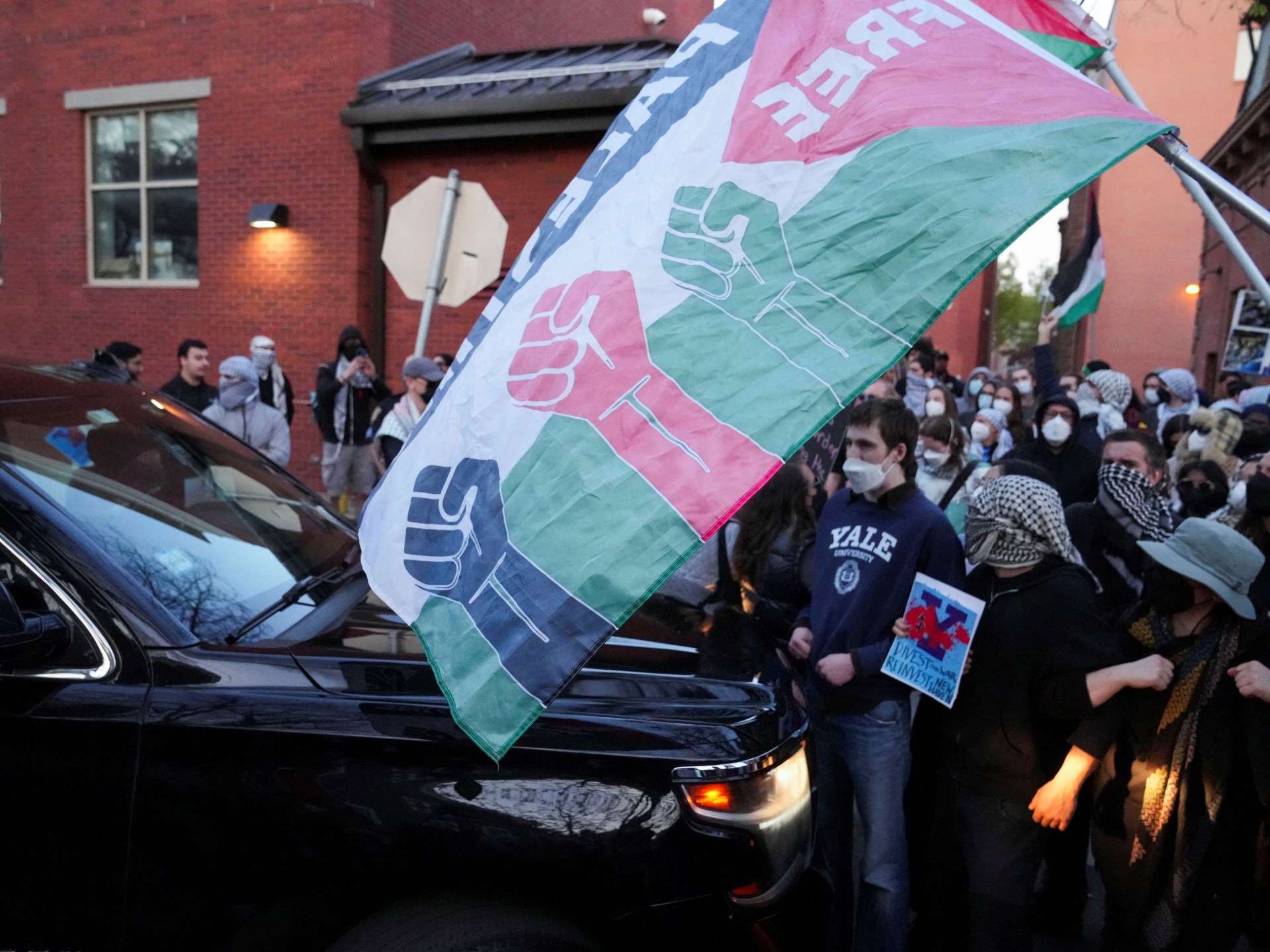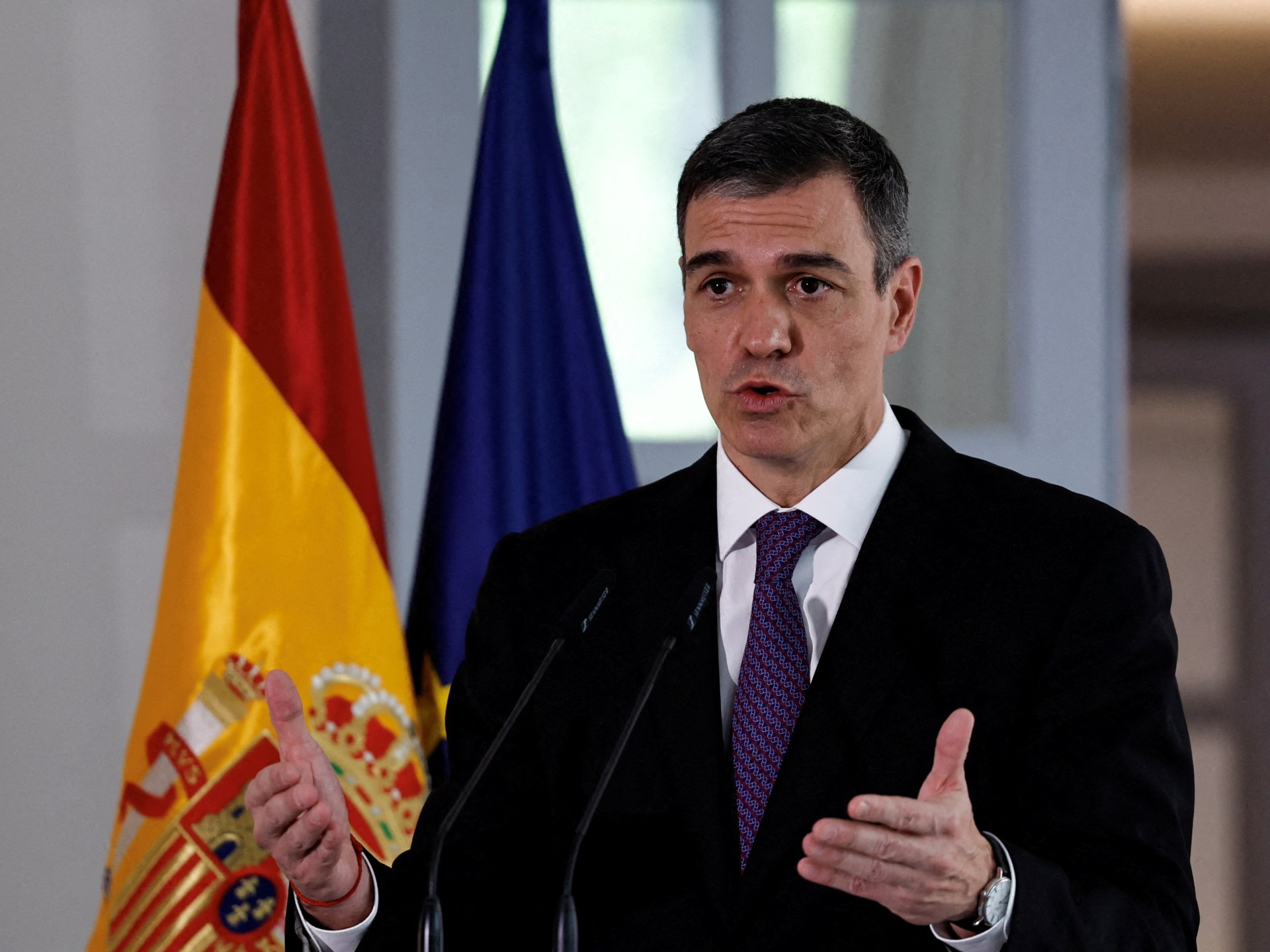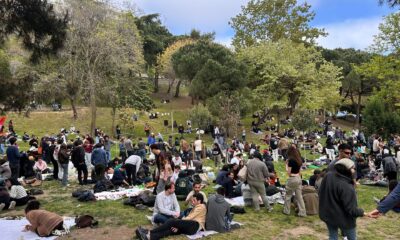Middle East
At least 59 Palestinians killed as Israel escalates Gaza bombardment | Gaza News

At least 59 people, including children, have been killed in a barrage of Israeli attacks across the besieged Gaza Strip, medical sources told Al Jazeera.
Rescue teams and medics in the enclave said at least 12 people belonging to the same family were among those killed on Thursday when their home in northern Gaza’s Jabalia was targeted.
Six members of another family – a couple and their four children – were killed when an air strike levelled their home in Gaza City, the civil defence said in a statement.
Ahmed Arar, a first responder in Gaza City, said there were “large quantities of body parts and remains”, including those of many children, after the attack.
“There are only hands, legs, and heads. They are all severed and torn,” Arar told Al Jazeera.
Another 10 people were killed and several others wounded in a strike on a former police station in the Jabalia area of northern Gaza, according to a statement from the Indonesian Hospital, where the casualties were taken.
“Everyone started running and screaming, not knowing what to do from the horror and severity of the bombing,” 23-year-old Abdel Qader Sabah, from Jabalia, said of the attack that hit the station that is located near a market.

Israel’s military said it struck what it described as a Hamas “command and control centre” in the Jabalia area, without clarifying if it was targeting the police station. The army has previously used similar justifications in attacks that hit hospitals and numerous shelters housing displaced Palestinian families.
At least 26 people were killed in other Israeli attacks across the territory, according to medics and the civil defence agency.
Al Jazeera’s Tareq Abu Azzoum, reporting from Deir el-Balah, said there is “an ongoing surge in the rate of Israeli attacks on the entire Gaza Strip”.
He said that civil defence crews are still working to dig through the rubble at the scene of the latest attack in Jabalia.
He cited one rescue worker as saying many of the victims have sustained burn wounds.
‘Larger’ offensive?
Israel resumed its military assault on the Gaza Strip on March 18, ending a two-month ceasefire that had brought a temporary halt to fighting in the blockaded territory.
The military is continuing to seal vital border crossings for the eighth week in a row, denying the entry of much-needed humanitarian aid, including medical supplies and fuel, worsening an already deep humanitarian crisis amid relentless bombardment.
Israel’s army chief, visiting troops in Gaza on Thursday, threatened a “larger” offensive if captives seized in the Hamas-led attack on Israel on October 7, 2023, are not freed.
“If we do not see progress in the return of the hostages in the near future, we will expand our activities to a larger and more significant operation,” Eyal Zamir said.
The Israeli military, meanwhile, ordered Palestinians living in the northern areas of Beit Hanoon and Sheikh Zeid to evacuate in advance of an attack.
The United Nations has warned that Israel’s expanding evacuation orders across Gaza are resulting in the “forcible transfer” of people into ever-shrinking areas.
Aid agencies estimate that the vast majority of Gaza’s 2.4 million residents have been displaced at least once since the war began.
Also on Thursday, the Gaza Health Ministry said the Durra Children’s Hospital in Gaza City had become nonoperational, a day after an Israeli strike hit the upper part of the building, damaging the intensive care unit and destroying the facility’s solar power panel system.
Gaza’s health system has been devastated by Israel’s 18-month-old military campaign, putting many of the territory’s hospitals out of action, killing medics, and reducing crucial supplies.
Efforts by key mediators Qatar and Egypt, backed by the United States, have so far failed to produce a lasting ceasefire.
Since Israel resumed its assault, at least 1,978 people have been killed in Gaza, raising the overall death toll to at least 51,355 since October 2023, according to the Gaza Health Ministry.
The military said Thursday that Israeli tank fire killed a UN worker in the central Gaza city of Deir el-Balah last month, according to an investigation’s initial findings.
It had initially denied operating in the area where a Bulgarian employee of the United Nations Office for Project Services (UNOPS) was killed on March 19.
The findings come after the military on Sunday reported on a separate probe into the killing of 15 Palestinian emergency workers in Gaza.
It finally admitted that operational failures led to their deaths, and said a field commander would be dismissed.
Middle East
‘Deepest contradictions’: Yale bans pro-Palestine group amid Ben-Gvir visit | Gaza News

Yale University has become the latest top institution in the United States to ban a pro-Palestine group, this time for protests against a visit by far-right Israeli National Security Minister Itamar Ben-Gvir.
Ben-Gvir’s stop near the university in New Haven, Connecticut, on Wednesday sparked outrage as protesters criticised the minister’s support for surging attacks on Gaza, and most recently, his calls to bomb “food and aid depots” in the Palestinian territory.
Speaking to Al Jazeera, Raed Jarrar, the advocacy director at Democracy for the Arab World Now (DAWN), described the university’s silence about Ben-Gvir, who has “openly called for genocide”, and its subsequent crackdown on protesters “not just a moral contradiction – it’s a moral and legal failure”.
The demonstrations began on Tuesday night when protesters gathered on campus and began setting up tents at a short-lived encampment. While lasting just a few hours, the scene was similar to encampment protests that swept across US universities last year, often prompting crackdowns and policy changes from administrators.
The next day, Yale said in a statement that the encampment had violated its policies related to the use of outdoor spaces and students who had been warned or punished in previous incidents would face “immediate disciplinary action”.
It added that the university was investigating “concerns … about disturbing anti-Semitic conduct at the gathering” without providing any details.
The administration also said the student organisation Yalies4Palestine would lose its official status for sending “out calls over social media for others to join the event” and for later taking credit for the event.
In a statement to the student newspaper, the Yale Daily News, a group of pro-Palestine protesters denied the event was affiliated with or planned by any group.
The protests then continued on Wednesday night when Ben-Gvir arrived for a speech at the Shabtai, a private Jewish society that describes itself as “based at Yale University” although it is not formally affiliated with or located at a property owned by the university.
Ben-Gvir briefly taunted the protesters with what his office told CNN was a “victory sign” gesture as he was met with chants of “shame on you”, according to video of the event.
His office later said a water bottle had been thrown at him from the crowd, which included students and nonstudents, and he was unharmed.
‘Attacking students … won’t save Yale’
Yale’s latest punishment for pro-Palestine protesters comes during a wider pressure campaign on top universities by the administration of President Donald Trump.
While former President Joe Biden was seen as endorsing crackdowns on pro-Palestine protests, which he broadly described in April last year as “anti-Semitic”, the Trump administration has escalated the response.
Using claims of “anti-Semitism”, the Trump administration has sought to deport noncitizen pro-Palestine university protesters and has frozen or threatened to freeze federal funding for several top institutions, including Columbia University in New York and Harvard University in Massachusetts, if they do not agree to a series of policy changes.
Throughout the protest movement, organisers have repeatedly challenged the notion that such demonstrations are anti-Semitic, noting the regular involvement of Jewish students and disavowing rare instances of anti-Jewish statements made at often publicly open demonstrations.
In their statement carried by the student newspaper, pro-Palestine protesters at Yale accused administrators of coming down particularly harshly to avoid recourse from the Trump administration.
“Attacking students and alienating community members didn’t save Harvard or Columbia. It won’t save Yale,” they said.
Yale did not reply to Al Jazeera’s request for comment on whether concerns about a Trump administration response informed its disciplinary actions or if it had any response to Ben-Gvir’s visit.
For her part, Harmeet Dhillon, the assistant attorney general of the Department of Justice’s Civil Rights Division, responded to a video on X showing protesters refusing to break a human chain to allow a student to pass through their ranks on campus.
The post claimed: “Jewish students aren’t allowed to walk through Yale’s campus anymore!”
Dhillon wrote that her office is “tracking the concerning activities at Yale, and is in touch with affected students”.
While critics said heavy-handed responses to pro-Palestine protesters have become commonplace in the US, some observers said the dissonance on display at Yale has been particularly striking.
Ben-Gvir was convicted in 2008 by an Israeli court of inciting racism and supporting a “terrorist” organisation, the founded Kach group, which supported the annexation and ethnic cleansing of the Palestinian territories.
He has called for a no-holds-barred military operation in Gaza, where UN experts already say Israel is committing “genocidal acts”.
He has appealed for Israel to commit what would constitute war crimes under international law in Gaza. Most recently, he posted on X that he told “senior Republican officials” at Trump’s Mar-a-Lago estate in Florida that Israel should bomb “food and aid depots”.
‘Deepest contradiction’
Eman Abdelhadi, a sociologist at the University of Chicago, said Yale’s silence regarding Ben-Gvir speaking at an organisation that claims to be based at the university “exposes the deepest contradictions in our society and in these institutions that are supposed to be dedicated towards truth seeking and critical thought”.
“[Ben-Gvir] faces no red line,” she said. “But the people protesting can face severe consequences.”
“This is a moment where universities are fighting for their lives and trying to argue to the American public that they are worth saving in the face of Trump’s onslaught,” she said. “And yet they show no moral courage.”
Middle East
Palestinian officials vote to create a vice presidency under Mahmoud Abbas | Palestinian Authority News

The expectation is that whoever holds the role would be the frontrunner to succeed President Mahmoud Abbas, 89.
The Palestine Liberation Organisation (PLO) has announced the creation of a vice presidency under 89-year-old leader Mahmoud Abbas, who has not specified a successor.
After a two-day meeting, the body’s central council voted on Thursday to create the role of vice chairman of the PLO Executive Committee. This position would also be referred to as the vice president of the State of Palestine, which the Palestinians hope will one day receive full international recognition.
The expectation is that whoever holds that role would be the frontrunner to succeed Abbas, though it’s unclear when or exactly how it would be filled. Abbas is to choose his vice president from among the other 15 members of the PLO’s executive committee.
The PLO is the internationally recognised representative of the Palestinian people and oversees the Western-backed Palestinian Authority (PA), which exercises limited autonomy in some areas of the Israeli-occupied West Bank. Abbas has led both entities for 20 years.
Hamas, which won the last national elections in 2006, is not in the PLO. Hamas seized control of Gaza from PA security forces in 2007, and reconciliation attempts between the rivals have repeatedly failed.
Polls in recent years have shown plummeting support for him and his Fatah party.
Western and Arab donor countries have demanded reforms in the PA for it to play a role in post-war Gaza. The authority is deeply unpopular and faces longstanding allegations of corruption and poor governance. Appointing an heir apparent could be aimed at appeasing his critics.
Hamas slammed Abbas on Thursday for comments he made a day earlier, where he described the group as “sons of dogs” and urged it to release Israeli captives and lay down arms.
“Abbas repeatedly and suspiciously lays the blame for the crimes of the occupation and its ongoing aggression on our people,” Senior Hamas official Basem Naim said.
Since Israel’s war on Gaza resumed on March 18, at least 1,928 people have been killed there, bringing the total death toll since the war erupted in October 2023 to at least 51,305, according to the Palestinian Ministry of Health.
Abbas has been seeking greater relevance and a role in post-war planning for the Gaza Strip after having been largely sidelined.
Talks on a new ceasefire appear to have made little progress, and a Hamas delegation is in Cairo for renewed negotiations with key Egyptian and Qatari mediators.
Middle East
Spain halts controversial $7.5m deal to buy ammunition from Israeli company | Israel-Palestine conflict News

Madrid, Spain – Spain’s government halted a controversial $7.5m deal to buy ammunition from Israel on Thursday, following criticism of it from far-left allies within the governing minority coalition.
The country’s socialist prime minister, Pedro Sanchez, intervened to cancel the deal after Sumar, a group of left-wing parties, threatened to pull out of the governing coalition.
“After exhausting all routes for negotiation, the prime minister, deputy prime minister and ministries involved have decided to rescind this contract with the Israeli company IMI Systems,” a government source, who did not want to be named according to Spanish government practice, told Al Jazeera on Thursday.
Spain has been critical of Israel’s war on Gaza, and in October 2023, pledged to stop selling weapons to Israel. In February 2024, it said it also would not buy weapons from Israel. However, in the same month, the Spanish Ministry of Interior signed a deal with IMI Solutions to purchase 15 million rounds of ammunition. The ammunition was destined for the Civil Guard, Spain’s semi-military police force.
However, after protests from five ministers from Sumar, the Spanish government began a study to determine whether it was feasible to cancel the order.
“In October 2024, a study was started into the possible ending of the contract. After the study, the ministry decided to follow the recommendation from the state attorney, who advised against the ending of the contract at that stage, so the contract was honoured,” a spokesperson for the Spanish Interior Ministry told Al Jazeera, adding that ending “the contract would have involved paying … [IMI Solutions] without receiving the material.”
On Wednesday, April 23, the Interior Ministry said it would go ahead with the arms deal, six months after seeking to cancelling it, to avoid paying compensation to the Israeli company.
In response, Yolanda Díaz, deputy prime minister and leader of Sumar, told reporters in Barcelona, “This deal must be rectified. I insist, it is a flagrant violation of the agreements when we are witnessing the live genocide of the Palestinian people.”
Analysts said the row could further damage already tense relations between the Socialists and Sumar in Spain’s fragile government, especially after Sanchez announced on Tuesday that his government would raise defence spending to 2 percent of gross domestic product (GDP) to hit NATO targets, a move which angered Sumar. Under pressure from US President Donald Trump, Spain, which has the lowest NATO budget among its 32 members, rolled out a 10.5-billion-euro ($12bn) plan to meet the 2-percent goal this year.
Spaniards were divided over the ammunition deal, with a poll for online newspaper 20minutos.es showing that 48.46 percent of the 7,871 people surveyed opposed it, while 46.94 percent backed the deal and 4.58 percent did not know how they felt.
“Buying this ammunition would have shown that Spain is not supporting Palestine. It would have been a betrayal of the [more than] 50,000 people who have died in Gaza in the genocide there,” Igor Otxoa, of the Guernica Palestine organisation, a civic organisation, told Al Jazeera.
In the wake of the dispute, Veronica Martinez Barbero, Sumar’s parliamentary spokesperson, told Al Jazeera Spain should not go ahead with the contract.
“There is a question of not completing promises. The defence minister said Spain would not buy these weapons. We want this to be rectified, and this contract not be completed,” she said.
But not everybody has supported the decision to cancel the contract. Astrid Barrio Lopez, a political analyst at the University of Valencia, told Al Jazeera the decision “shows that there is little judicial security for companies dealing with the Spanish government and little leadership within the government”.
The Israeli embassy in Madrid could not be reached for comment.
-
Europe2 days ago
How to visit Rome for Pope Francis’ funeral and conclave
-

 Sports2 days ago
Sports2 days agoLA Lakers level first-round series against Minnesota Timberwolves behind big Luka Dončić performance
-

 Education1 day ago
Education1 day agoHarvard’s president says the school will ‘not compromise’ on its rights with the Trump admin
-

 Conflict Zones2 days ago
Conflict Zones2 days agoWhite and Black farmers still bear the scars of Zimbabwe’s land grabs | Poverty and Development News
-

 Middle East2 days ago
Middle East2 days ago‘I don’t know where I will go’: Refugees run out of options in Tunisia | Migration News
-

 Middle East2 days ago
Middle East2 days ago‘I grabbed my cat and ran’: Istanbul panics as earthquake hits | Earthquakes News
-
Europe2 days ago
New Prince Louis photo released to mark 7th birthday
-

 Africa2 days ago
Africa2 days agoEmmanuel Macron starts two-day visit to Madagascar




